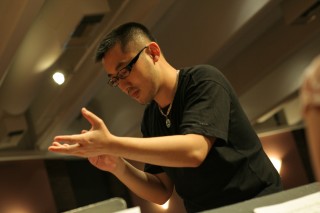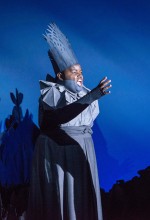Column Name
Title

In 1999, the Lincoln Center Festival mounted an expansive reconstruction of the 400-year-old Chinese opera The Peony Pavilion. Lauded by The Los Angeles Times as “one of the great cultural events of our age,” the 20-hour production contained 550 original costumes embroidered by 400 women, and starred Chinese opera singer Qian Yi as a woman who dies from her longing for a scholar, and then is brought back to life. As soon as he could get his hands on a recording of the extravaganza, Huang Ruo (seen above), an undergraduate composition student at Oberlin, started watching. “It was epic,” Huang, who subsequently received his master’s and doctoral degrees from Juilliard—recalled in a recent interview with The Journal.
Body
This summer—17 years, a Luxembourg Prize, multiple professorships, and innumerable accolades later—Huang brought to Lincoln Center Festival a “second chapter” in the journey of that character. Huang’s fourth opera, Paradise Interrupted, starred Qian again as The Woman, who remains unnamed throughout the opera.
Though (perhaps mercifully) not as long as Peony Pavilion—it’s only 80 minutes—Paradise Interrupted provided an equally mesmerizing visual experience in part thanks to Emmy-winning director/designer Jennifer Wen Ma, most noted for her design of the 2008 Beijing Olympics opening and closing ceremonies. While the look of a production isn’t generally the concern of the composer, Huang said that he worked with Wen Ma throughout the process and that they “developed the idea together, almost simultaneously. We knew we would have the onstage installation of the garden, and then we developed the elements of the story together along with Qian Yi and the librettist, Ji Chao.”
Huang has made a career out of his unique combination of both his Western and Eastern influences. Born on China’s Hainan Island in 1976 to a composer father, Huang moved to the United States in 1995 to study at Oberlin and has resided here ever since. “I’ve now lived in the U.S. longer than I lived in China, and I hope my music shows my journey,” he said, adding that he sees his music not as a fusion between two disparate cultures, but rather as a unified, self-contained integration of both languages. “I like to boil down to the DNA of things—to the very basic elements—no matter if it is Western or Eastern material,” he said. “Then I use that DNA to re-create something out of that, so it’s more organic than collage.”
Paradise Interrupted, which debuted at the 2015 Spoleto USA festival, fulfilled a musical dream of Huang’s to include both Eastern and Western operatic singing in the same work. “They are as different as one can imagine,” he said, “but if you put them together, it creates not only a fantastic contrast, but a very colorful coexistence.” The central character, played by Qian, sings in only the Chinese Kunqu style, but is guided by four male spirits—a bass, a baritone, a tenor, and a countertenor, all of whom sing in the Western operatic style. The countertenor part was sung by John Holiday (Artist Diploma, '14, voice) and was particularly mesmerizing.
Huang’s mixing of idioms is also reflective of the state of globalization in the 21st century. “Our world is very integrated now, but I think music is one of the last places to be open to that. By contrast, let’s take food. People are so open-minded to all kinds—you could go down the street and have Italian food or have Mexican food.” Still, he added, “I think with music, people are starting to be able to hear works that have the integration of different elements of different parts of the world. In this sense, the subject of the opera calls for this way of writing as well. My hope is that when this opera plays in front of a Western audience, they do not think it is a Western opera, and that when it plays in front of a Chinese audience, they do not think it is an Eastern opera.”
Now a composition professor at the Mannes School of Music, Huang tries to impart this open-mindedness to his students, encouraging them to write in many diverse genres. “When you are young, you might find something very challenging—yet you had the guts to do it. This is the time to do that,” Huang said. Before turning 30, he never thought he would write an opera. “I always felt opera was so difficult, so unapproachable, but suddenly, I got bitten by the bug, and now I just keep writing operas,” the composer, who’s now 39, explained. When writing in different genres, “some things you might like, and some things you might not like, but until you try it, you will never know if you like it or not, or why.”
The notion of the freedom that trying new things can bring was one that in part comes from Huang’s Juilliard composition teacher, Samuel Adler, who retired from Juilliard’s composition faculty in 2014. “In my first lesson, he told me, ‘I will give you suggestions, and sometimes you might take them, and sometimes you might really believe in your idea and your writing, and you don’t have to take my ideas.’ That really helped me,” Huang said. “Adler didn’t try to turn me into him, or to ask me to do exactly what he said. That freedom and respect, as a young composer, was tremendously helpful and valuable.”
Inspired by that, Huang tells his own students that he’s their teacher but also their colleague—they’re both composers. “A teacher should help students be who they are. We can offer students techniques to help them find and define their own voice, but we should not give them their voice.”





